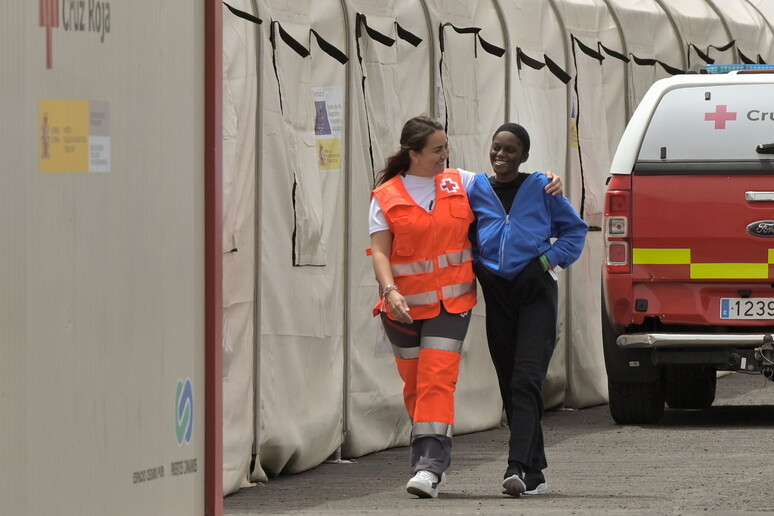Measure to relieve migrant influx in the south.
Under current EU rules, the country of arrival bears responsibility for hosting and vetting asylum-seekers, and returning those deemed inadmissible, a system that has put southern states under pressure and fuelled far-right opposition.
New border centres would hold irregular migrants while their asylum requests are vetted under the new system. And deportations of those deemed inadmissible would be sped up.
The reform would require EU countries to take in thousands of asylum-seekers from "frontline" states such as Italy and Greece.
Alternatively, they could provide money or other resources to the under-pressure nations. At least 30,000 asylum-seekers a year will come under this relocation system. An annual financial compensation of 600 million euros ($650 million) would be fixed for those preferring to pay instead of host.
The first-entry countries, such as Italy, von der Leyen assured that from now on "they will no longer be alone" in the face of the challenges posed by immigration. "The pact takes our needs into account," Piantedosi stressed. "It is the best possible compromise. (…) Italy played an important role as did the European People's Party, EPP," Italian Foreign Minister Antonio Tajani commented.
In an interview, a day before the final vote, Commissioner Johansson pointed out that with the new pact also "a number of loopholes with regard to secondary movements" would be closed.
It is already planned that, after a two-year transposition period, "if a person arrives in Portugal and asks for asylum in Portugal, they have to stay in Portugal", explained Ylva Johansson in response to news agency Lusa. This came at a time when there are fears that the country could be a gateway to the EU for migrants who then want to settle in countries like Germany or France.
The package establishes an emergency response in the event of unexpected migration surges, the same sort of crisis the EU faced in 2015-2016 when more than two million asylum-seekers entered the bloc, many of them from war-torn Syria and Afghanistan. Asylum requests stood at 1.14 million in 2023, the highest level since 2016.
Tusk vows to "protect" Poland against EU migrant relocation.
Polish Prime Minister Donald Tusk on Wednesday said his government would "protect Poland against the [European Union] relocation mechanism".
Poland's right-wing PiS party, in power until the October 2023 elections, was a fierce critic of the reforms, and the new governing alliance led by Tusk, despite its largely pro-EU views, has maintained that stance.
Migration deals.
In parallel with the reform, the EU has reproduced the same sort of deal it struck with Turkey in 2016 to stem migratory flows.
The EU has reached accords with Tunisia and, most recently, Egypt that are portrayed as broader cooperation arrangements.
Many lawmakers have, however, criticised the deals.
Bulgaria, which borders Turkey, has been strongly affected by migrant flows from Turkey. This year it has seen a drop in illegal crossings compared to the same time in 2023, according to the then outgoing Interior Minister Kalin Stoyanov. On March 22, he said that this year there were 5,777 illegal crossings compared to 18,474 the year before.
Bulgaria's Schengen accession was initially vetoed in 2022 by Austria and the Netherlands as it was seen as a transit route for many immigrants to Central and Western Europe.
Opponents.
Marine Le Pen, the figurehead of France's far-right National Rally, complained the changes would give "legal impunity to NGOs complicit with smugglers".
She and her party's leader who sits in the European Parliament, Jordan Bardella, said they would seek to overturn the reform after EU elections in June, which are tipped to boost far-right numbers in the legislature.
Orbán's government reaffirmed Hungary would not be taking in any asylum-seekers.
"This new migration pact practically gives the green light to illegal migration to Europe," Hungary's Foreign Minister Peter Szijjarto said before the vote, adding that Budapest "will not allow illegal migrants to set foot here in Hungary".
The Slovak Republic unequivocally rejected the new EU Migration Pact and said it did not agree with the compulsory redistribution of illegal migrants, Slovak Foreign Minister Juraj Blanár said after the vote on Wednesday.
Czech MEPs have voiced support for some elements of the migration package, while rejecting others. Their stance reflects criticism that the proposals fall short of comprehensive solutions to the migration challenge and lack ambition.
Additionally, Czech representatives have expressed concerns about the package's failure to address strategies for migration prevention.
(continues).
(The content is based on news by agencies participating in the enr, in this case AFP, AMNA, ANSA, BTA, CTK, dpa, EFE, Europa Press, Lusa, TASR, Tanjug).
ALL RIGHTS RESERVED © Copyright ANSA











